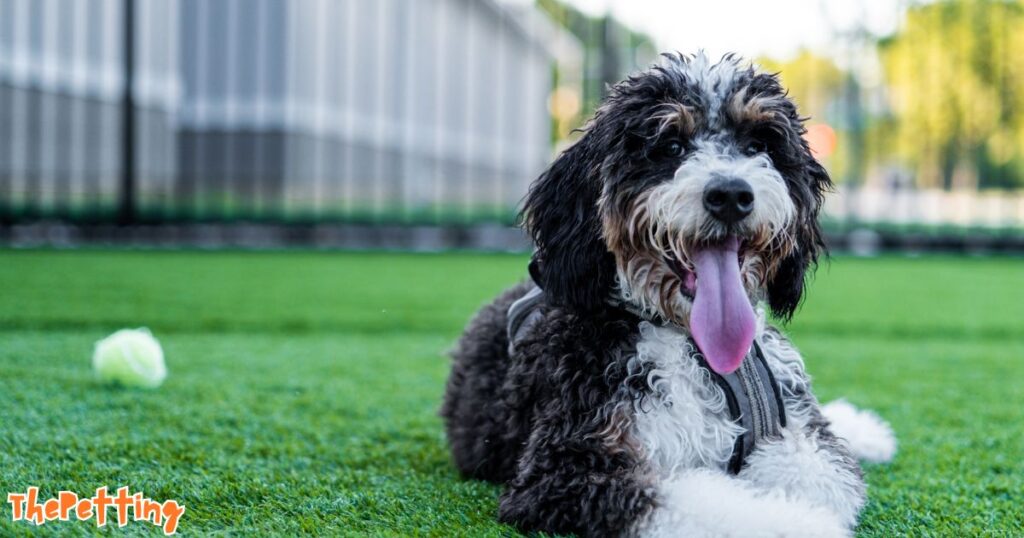Creating a balanced diet for your Mini Bernedoodle is crucial for their overall health and well-being. This guide will help you understand the key components of a nutritious diet for your Mini Bernedoodle, including the right types of food, necessary nutrients, and feeding guidelines.

Understanding Mini Bernedoodle Nutritional Needs
Mini Bernedoodles are a hybrid breed with specific dietary requirements. These dogs, known for their playful and affectionate nature, need a diet that supports their active lifestyle and maintains their health.
Key Nutritional Components
- Protein: Essential for muscle development and overall health. High-quality animal proteins such as chicken, beef, and fish should be the primary source.
- Fats: Provide energy and support healthy skin and coat. Look for sources like fish oil and chicken fat.
- Carbohydrates: Offer energy and aid in digestion. Choose whole grains and vegetables.
- Vitamins and Minerals: Support immune function and overall health. Ensure the diet includes a variety of fruits and vegetables.
- Fiber: Helps with digestion and prevents gastrointestinal issues. Incorporate ingredients like sweet potatoes and carrots.
Choosing the Right Food for Your Mini Bernedoodle
Dry Food vs. Wet Food
Dry Food (Kibble):
- Advantages: Convenient, helps with dental health.
- Disadvantages: Can be less palatable, may contain fillers.
Wet Food:
- Advantages: More flavorful, higher moisture content.
- Disadvantages: More expensive, can lead to dental issues if used exclusively.
Tip: A combination of dry and wet food can provide the benefits of both.
High-Quality Ingredients
When selecting food, look for:
- Named Meat: Chicken, lamb, or beef as the first ingredient.
- Whole Grains: Brown rice, barley.
- Healthy Fats: Omega-3 and Omega-6 fatty acids.
For more information on selecting high-quality dog food, visit American Kennel Club.
Feeding Guidelines for Mini Bernedoodle Puppies
Puppies have different needs compared to adults. Their diet should be rich in protein and calories to support growth and development.
- Frequency: Feed puppies three to four times a day.
- Portion Size: Follow the recommendations on the food packaging, adjusting based on growth and weight.
- Transitioning: Gradually switch from puppy food to adult food around 12 months of age.
Adult Mini Bernedoodle Feeding Schedule
Frequency:
- Adults: Twice a day.
Portion Control:
- Guideline: Typically, 1 to 1.5 cups of high-quality dry food daily, divided into two meals.
Special Dietary Considerations
Weight Management
Mini Bernedoodles are prone to weight gain. Monitor their weight and adjust their food intake accordingly. Avoid overfeeding and use low-calorie treats.
Food Allergies
Some Mini Bernedoodles may have food sensitivities. If you notice signs of allergies (e.g., itching, digestive upset), consult your vet and consider a hypoallergenic diet.
Age-Specific Needs
- Senior Dogs: May require lower calories and added joint support.
- Active Dogs: Might need higher protein and fat levels.
Supplements for Mini Bernedoodles
Consider supplements if recommended by your vet:
- Omega-3 Fatty Acids: For a healthy coat and skin.
- Joint Supplements: Glucosamine and chondroitin for joint health.
Monitoring and Adjusting the Diet
Regularly assess your Mini Bernedoodle’s health and adjust their diet as needed. Keep an eye on their weight, coat condition, and energy levels.
Summary Table of Mini Bernedoodle Nutritional Needs:
| Nutrient | Recommended Source | Importance |
|---|---|---|
| Protein | Chicken, Beef, Fish | Muscle development, energy |
| Fats | Fish oil, Chicken fat | Healthy skin and coat |
| Carbohydrates | Sweet potatoes, Brown rice | Energy, digestion |
| Vitamins & Minerals | Fruits, Vegetables | Immune support, overall health |
| Fiber | Carrots, Pumpkin | Digestion |
Conclusion
A balanced diet is essential for the health and happiness of your Mini Bernedoodle. By selecting high-quality food, understanding their specific nutritional needs, and adjusting their diet based on their age and activity level, you can ensure your Mini Bernedoodle thrives.
FAQs
1. What is the best type of food for Mini Bernedoodles?
High-quality dry food or a mix of dry and wet food with named meat as the first ingredient.
2. How much should I feed my Mini Bernedoodle puppy?
Feed 3 to 4 times a day, following the portion recommendations on the food packaging.
3. Can Mini Bernedoodles have allergies to certain foods?
Yes, they can have food sensitivities. Consult your vet if you notice signs of allergies.
4. How can I help my Mini Bernedoodle maintain a healthy weight?
Monitor their weight, avoid overfeeding, and use low-calorie treats if needed.
5. When should I transition my Mini Bernedoodle from puppy food to adult food?
Around 12 months of age, gradually transition to adult food.
